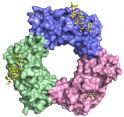
2016/01/13
The ubiquitin ligase TRAIP binds PCNA and protects the genome in response to replication stress.
The replication of the genetic material can be blocked or slowed down by different causes creating replication stress in the cell. This is the primary source of genome instability, and the cell triggers a replication stress response to prevent it. Researchers from the University of Copenhagen, in collaboration with groups at CIC bioGUNE and the Max Planck Institute of Biochemistry, have identified the E3 ubiquitin ligase TRAIP as a component of the DNA replication fork with an important role in promoting replication stress-induced signaling to protect genome stability. TRAIP directly interacts with the DNA sliding clamp PCNA though its PIP-motif, and loss of TRAIP function leads to enhanced chromosomal instability and decreased cell survival after replication stress. The ubiquitin ligase activity of TRAIP is essential for cell survival in response to replication blocks. Its interaction with PCNA is not essential but potentiates the response. Although TRAIP promotes polyubiquitylation of PCNA, it is not yet clear whether PCNA is its primary substrate in the replication stress response.
Link to the published article here
Figure. Threedimensional structure of the homotrimeric PCNA ring (colored surface) bound to the TRAIP fragment containing its PIP-motif (sticks).
See a large version of the first picture





